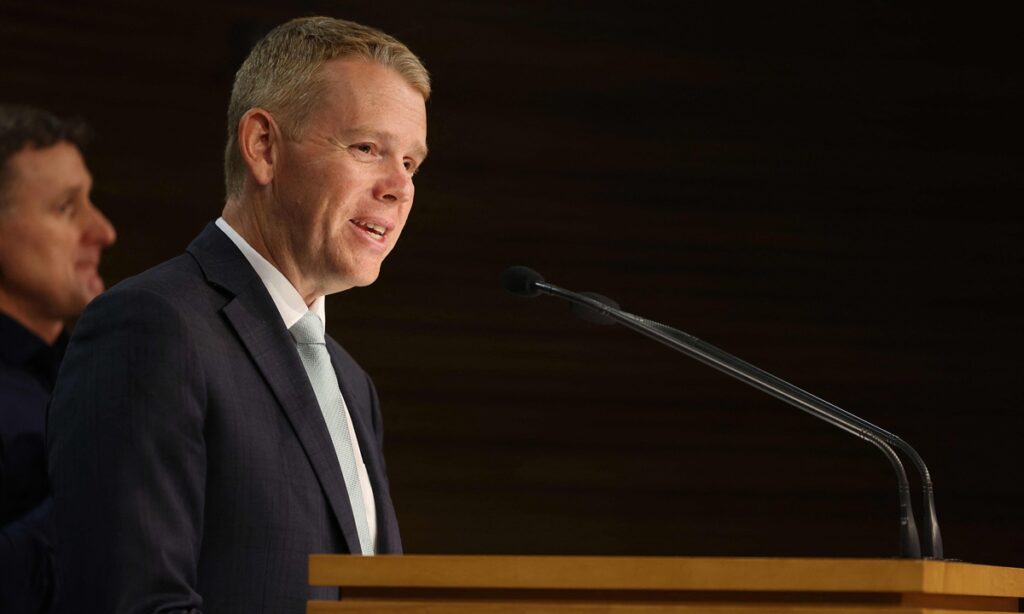Ties overcome external noises and pressure, set a model: analysts
New Zealand Prime Minister Chris Hipkins announced on Monday he would visit China in late June with a trade delegation, the first prime ministerial visit to China since the pandemic, at a post-Cabinet press conference.
Amid a turbulent global landscape and the US strong push for its “Indo-Pacific Strategy” in the South Pacific, China and New Zealand demonstrated how countries of different histories, cultures and systems can seek common ground while reserving differences so that both can benefit and jointly inject positivity into the region and the world, Chinese analysts said on Monday.
Hipkins described China ties as “most significant, wide-ranging and complex” on Monday, saying, “Our trade links, underpinned by our recently upgraded free trade agreement, have proven incredibly resilient in recent years.”
China stands ready to work with New Zealand to maintain high-level exchanges, enhance mutual trust and deepen practical cooperation, so as to achieve greater progress in bilateral relations and bring more benefit to the two peoples, Chinese Foreign Ministry spokesperson Wang Wenbin said at Monday’s routine press briefing, without confirming the reported Hipkins visit.
Top Chinese diplomat Wang Yi said in March during a meeting with visiting New Zealand Foreign Minister Nanaia Mahuta that China-New Zealand relations have long been at the forefront of China’s relations with developed Western countries. China appreciates New Zealand’s objective and friendly view of China’s development and its practical and positive policy toward China.
The key to stable development and fruitful achievements in China-New Zealand relations is that both countries seek to maximize common ground while reserving differences, Chen Hong,director of New Zealand Studies Centre at East China Normal University, told the Global Times on Monday.
Exports to China account for roughly one-quarter of New Zealand’s total export earnings and the two countries are eyeing greater cooperation with an upgraded China-New Zealand Free Trade Agreement and the Regional Comprehensive Economic Partnership, according to media reports.
In addition to traditional exports of dairy, meat and wood, emerging sectors like gaming and health and wellness are on the agenda, New Zealand’s 1News reported Monday.
Wang Jiazheng, chief representative of the Guangdong Economic and Trade Representative Office in New Zealand, told the Global Times on Monday that he hopes the Hipkins visit can facilitate mutual trust in politics and business between China and New Zealand, and provide more business opportunities and cooperation platforms for entrepreneurs from both countries.
Riding the cooperation momentum, the office will host a Chinese products expo in New Zealand this year, which will also be conducive to business exchanges, bringing more business opportunities and benefiting people of both countries, Wang noted.
The business delegation coming with Hipkins would also include representatives from the tourism and education sectors, areas which have “ushered in great potential after the pandemic and can also boost people-to-people exchanges and enhance mutual understandings between the two peoples,” Chen said.
Admittedly, New Zealand faces great pressure from its Western allies and has to cope with major changes in the global landscape.
At the Monday press conference, Hipkins said, “Where we have human rights concerns we will raise them, where we have concerns around trade or any other policy issue we will raise those.” His comments were similar in tone to that of New Zealand Foreign Minister Mahuta ahead of her China visit in March.
Human rights and “economic coercion” are some of the excuses the US frequently use to mobilize allies to attack China politically and try to “decouple with China” economically.
Despite the pressure, New Zealand is clear-headed about its practical interests and does not give away its autonomy, experts said.
In recent years, New Zealand has shown an ability to grasp the big picture and successfully overcome external noises in developing relations with China, and analysts are hopeful that the Hipkins administration will continue steadily on that path.
When the US pushes its “Indo-Pacific Strategy” strongly, countries in the South Pacific, carefully navigating through the US-initiated rivalry with China, seek to prioritize their own national interests, Chen said, “For them, China’s positive role in promoting regional stability and prosperity is fully recognized.”
(Global Times)




